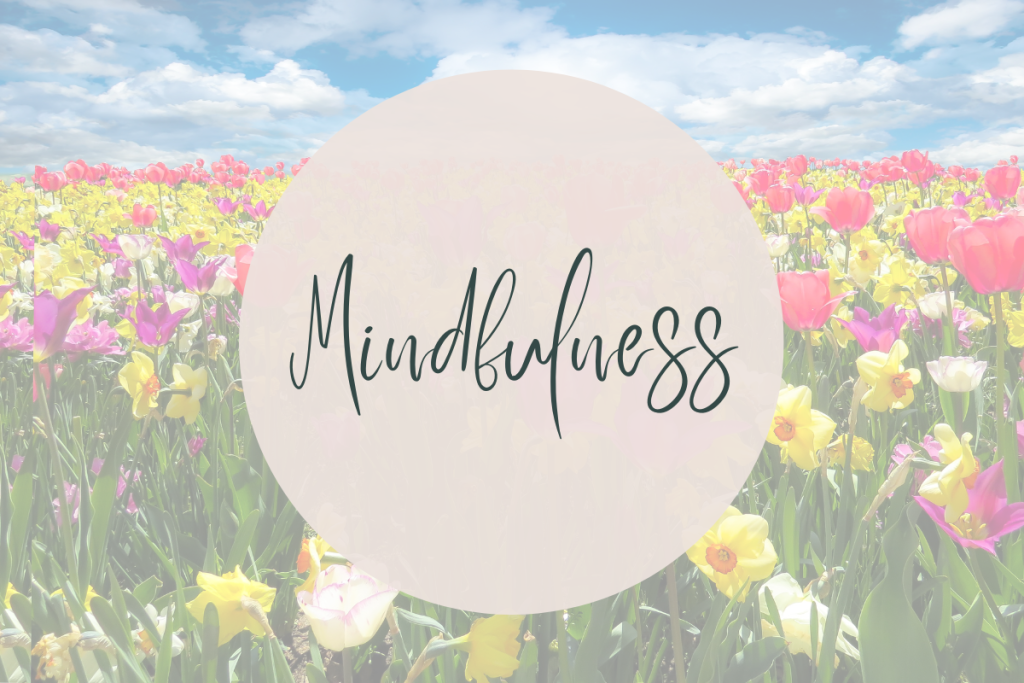A New Take on Life | April Showers Bring May Flowers
Mindfulness – What’s all the Buzz?
Mindfulness: I keep hearing this word both from my clients and on social media posts. When I think about mindfulness, I am reminded that within the span of a few minutes our human brains can have a dozen different thoughts which will cause all sorts of different emotions all at once. Depending on the type of thought, if we do not take them captive (2 Cor. 10:5) they can quickly spiral out of control and take us down paths that are not productive or healthy. Mindfulness means that we can maintain a moment-by-moment awareness of our thoughts, feelings, body sensations and surroundings, through a gentle nurturing lens.

Some questions that have come up when discussing mindfulness are: what is mindfulness, how can mindfulness help me, how do I do it, and is it Biblical?
The prolific author and peace activist, Thich Nhat Hanh is often referred to as the “father of mindfulness”, he said, “The opposite of forgetfulness is mindfulness. Mindfulness is when you are truly there, mind and body together. You breathe in and out mindfully, you bring your mind back to your body, and you are there.” In 1979, Jon Kabat-Zinn recruited chronically ill patients who were not responding to traditional treatments to participate in his newly formed eight- week stress-reduction program that we now call Mindfulness-Based Stress Reduction (MBSR). Since then, substantial research has been put into mindfulness-based interventions to improve mental and physical health.
Mindfulness is one of those things that we must practice the concept of “don’t throw the baby out with the bathwater. ”Obviously mindfulness and meditation is rooted in Buddhist traditions and has moved into other modern and secular movements as created by Jon Kabat-Zinn. Not everyone subscribes to these and in fact, many Christian’s think of things like mindfulness, meditation, and Yoga as things that are satanic and rooted in evil. I like to stay out of the world of extremes and not “throw out the baby” so to speak.
Mindfulness and meditation can be wonderful tools to help people who suffer from many forms of mental health issues such as depression, anxiety, OCD, ADHD, and addiction.

Mindfulness allows you to bring your attention to the present moment. It promotes the ability to relax, to center, and to calm emotions that have gotten out of control in a non- judgmental way. The Mayo Clinic explains that neuroplasticity is the brain’s ability to modify, change, and adapt both structure and function throughout life and in response to experience. Neural pathways are developed through synaptic connections that occur in our brains, directly resulting in our habits and behaviors. These connections create a map, hence, because mindfulness practices require repetition, they have the propensity to change and heal the brain.
The practice of meditation can result in an individual lowering his or her blood pressure, can help improve heart rate, and can help improve controlled breathing which can help a person quickly come out of an anxiety or panic attack. Meditation can be directly correlated to a reduction in one’s stress levels which has a positive effect on the immune system. Stress, anxiety, and depression can all be powerful triggers for someone who is in recovery from addiction, so practicing mindfulness and meditation can be extremely beneficial to prevent relapse.
A Biblical mindfulness exercise:
Mindful walking would be a great way to focus on Scripture while you walk and have awareness of your breath, your movements, and your surroundings which are full of God’s amazing creations. Here are several verses that you can memorize and repeat while you walk:

My commitment to God (Psalm 19:14)
My assurance of God (Psalm 46:10)
My position before God (Psalm 63:1)
My practice serving God (Psalm 34)
My vulnerability to God (Psalm 139:23, 24)
My priorities before God (Colossians 3:12-14)
My surrender to God (Galatians 2:20)
My rescue through God (Matthew 11:28, 29)
My hope in God (John 16:33)
APRIL BOOK RECOMMENDATION
Breath as Prayer: Calm Your Anxiety, Focus Your Mind, and Renew Your Soul by Jennifer Tucker
Breathe as Prayer will lead you through the practice and the proven health benefits of Christian Breath prayer: intentional prayers centered around Scripture that focus our minds on Christ as we calm our bodies through breathing.
Breath as Prayer offers:
– More than 80 breath prayers focused on Scripture, along with brief meditations
– Gorgeous original full-color illustrations
– A quick-start, how-to guide to refer to as needed
– Guidance on how to implement a breath prayer practice
– The science behind breath work and prayer and why it works
– An invitation to reflect on the effect of breath prayers on your body
With a beautiful foil-accented cover, Breath as Prayer is an ideal gift for:
– Anyone experiencing stress, anxiety, or fear
– Grief and anxiety support groups
– Prayer groups and prayer ministries
– Men and women looking for new avenues for connecting with God
– Teens and young adults dealing with stress and anxiety
– Adult baptism and confirmation
God created our bodies, minds, and spirits to be intimately connected with one another. Purpose-filled breathing is one of the most effective, calming ways to integrate all aspects of who we are, especially during times of intense stress. Breath as Prayer invites you to the crossroads of Christian contemplative practice, Scripture, psychology, and science to deepen your faith, bring peace to your body, and discover a new reliance on Christ. Breathe deeply, lean into God’s word, and discover why every breath can be an invitation to pray.
Jessica Pottorff, MS, MA, T-LMHC, CADC

Jessica holds a Master of Arts degree in Christian Counseling of Substance Abuse and Addictive Disorders as well as a Master of Arts degree in Clinical Mental Health Counseling. She is also a certified alcohol and drug counselor. Jessica is currently accepting new patients; please use the contact form if you would like to schedule a session with her.
Jessica is passionate about working through codependency issues, guilt and shame, and spiritual issues and allows God and Scripture to empower clients to see their potential and to find their identity in Christ. Jessica is authentic and builds rapport quickly with her clients by being personable, compassionate, and Christ-centered. She has a passion to help people develop a deeper relationship with God as they pursue wholeness in all areas of their lives.

